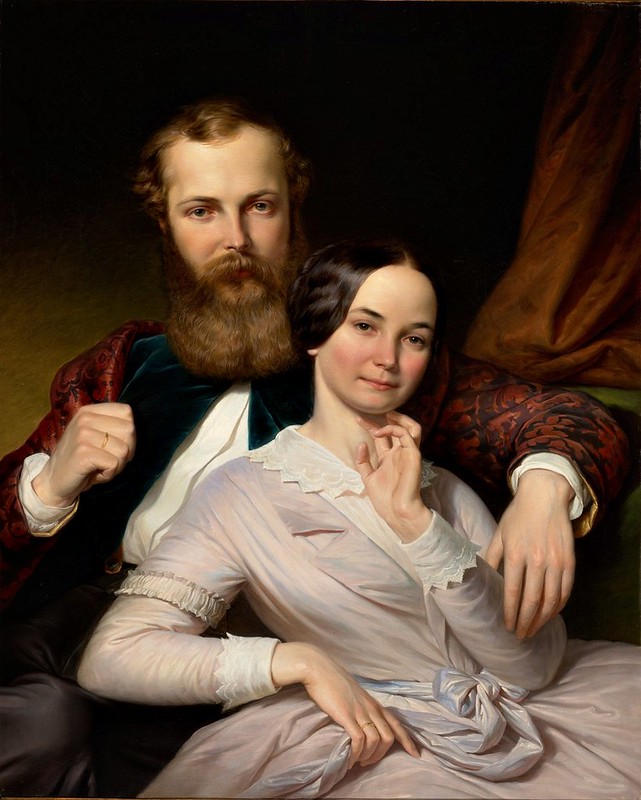Mihály Mosonyi (1815-1870)
- 3. F-dúr Mise (1849)
Performers: Vanessa del Riego Ledo (soprano); Simone Veder (alto); Lars
Terray (bariton);
Liszt Ferenc Chorus and Orchestra; Péter Scholz
Further info: Mosony - Mass No.3
---
Hungarian composer, teacher and writer on music. Like Liszt, he was born
in the border region between Hungary and Austria at the meeting-point
of several cultures. His name was originally Michael Brand, the same as
his father and grandfather, and his first language was German. The
fourth of 11 children in a family of furriers, he learnt the usual wind
instruments of peasant life. Boldogasszonyfalva was a famous place of
pilgrimage, and in its church, built by Prince Pál Esterházy, he had the
opportunity to practise the organ and, between the ages of 10 and 12,
to deputize for the cantor. In 1829 he left home to work as a church
officer in Magyaróvár, where he taught himself music by copying Hummel's
manual of exercises for the piano. About 1832 he moved to Pozsony (now
Bratislava), at that time the capital of the Hungarian kingdom. Its
cultural life was dominated by the nearby imperial city of Vienna, and
became acquainted with the great works of Viennese masters and resolved
to devote himself to music. He earned a living by teaching calligraphy,
copying music, and working as a newsboy, later and typesetter for a
printing firm, while he studied the piano and music theory with Károly
Turányi, who later became Kapellmeister in Aachen. Turányi and another
patron, Count Károly Keglevich, obtained for Mosonyi a position as a
piano teacher at the residence of Count Péter Pejachevich in the
Slavonian village of Rétfalu. There he spent seven years (1835-42),
becoming an accomplished pianist and, with the help of Reicha's
theoretical works, a composer. The compositions he finished in Rétfalu
reveal a diligent pupil of the Classical style. In 1842 he moved to
Pest, where he worked until his death. He never held a public, municipal
or ecclesiastical position, nor was he in the service of a theatre,
teaching institute or aristocratic household. One of the first
independent musicians in Hungary to earn a living by teaching the piano
and composition, his most famous pupils were Kornél Ábrányi (the elder),
Gyula and Sándor Erkel (sons of Ferenc), Sándor Bertha, and the future
director of the Budapest Academy of Music, Ödön Mihalovich.
He was encouraged to compose by the stimulating intellectual atmosphere
in Pest in the decade before the Hungarian War of Independence
(1848-49). On 3 October 1846 he married Paulina Weber, sister of the
famous portrait painter Henrik Weber. In the same year he began writing
his Second Symphony, which was not performed until ten years later. He
took part in the War of Independence as a member of the National Guard.
In 1849 he wrote a mass (his third) in memory of his benefactor and
godfather Peter Piller. The early death of his wife (13 July 1851)
brought on an emotional crisis, making it impossible for him to compose
for two years. The elegiac autumnal lyricism of the German songs
(1853-54), which were published by Breitkopf & Härtel, reflect his
grief and show him a fully fledged Romantic. In 1857, on the occasion of
the first visit to Hungary by the Empress (later Queen) Elisabeth, he
composed a piano piece in Hungarian style, Pusztai élet (‘Puszta Life’).
A whole year of compositional activity followed its favourable
reception, and from about 1859 he wrote a series of new works in the
national style. To give an outward gesture of his stylistic
transformation, he took the Hungarian name of Mosonyi in 1859, after his
place of birth (the county of Moson). In 1865 he went to Munich to
attend the first performance of Tristan und Isolde. In the same year he
played the double bass in the first performance in Pest of Liszt's
Legende der heiligen Elisabeth. In his last years he composed noteworthy
Hungarian art songs and ballads, and a series of choral works and
cantatas of less importance. In 1870, a few months before his death, he
was appointed to the programme selection committee of the Pest National
Theatre and was also a member of the committee to prepare the Hungarian
Beethoven centenary festival. He died with many ambitious hopes for a
Hungarian national music.

Cap comentari:
Publica un comentari a l'entrada